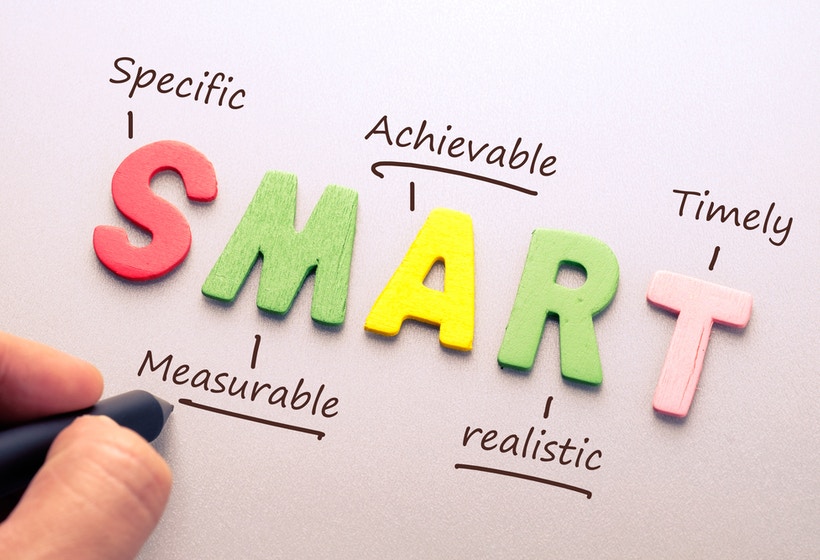Career Chronicles
Welcome to the New York Tech Career Chronicles Blog brought to you by Career Success and Experiential Education. Visit us for career advice, learn more about upcoming events and industry news as well as profiles of New York Tech alumni and students. We are here for you!
More Resources
ICYMI: Three Ways to Get SMART About Your Career Goals

The Career Services team has re-imagined their workshops to bring students a series of Career Bytes—short, “byte”-sized presentations. We kicked off our first of seven Career Bytes last week with a session on setting SMART career goals. Sam Mon, the Assistant Director of Career Services, discussed why setting goals is important, how to turn a general goal into a SMART goal, and cool tools to help students track progress toward their goals.
First things first! What is a career goal?
Setting a career goal is about deciding where you want to head in your career, and noting the steps needed to reach that point. It is a significant component of the career planning process.
Great! What makes a career goal SMART?
SMART is an acronym that stands for Specific, Measurable, Attainable, Relevant and Timely. Each component of the SMART framework works together to create a goal that sets boundaries and defines the steps you’ll need to take, resources necessary to get there and milestones that indicate progress along the way.
You may have set goals in your past that were difficult to achieve because they were too vague, or poorly framed. Creating SMART goals can help solve these problems and establish a strong foundation for achieving success.
Check out a breakdown of the SMART framework below!
S – Specific
Make sure your goal is specific and significant. Consider the 5 W’s and try to answer them: WHO is involved? WHAT do I wish to accomplish? WHERE do I want to accomplish this goal? WHY do I want to accomplish it? WHEN will I accomplish it? When you get specific with your goals, you’re much more likely to accomplish them.
M – Measurable
Define what benchmarks will prove you’re making progress toward your goal. Establish criteria for tracking progress on each goal you set to stay focused, meet deadlines, course-correct and experience momentum. A measurable goal should address the following questions: How much? How many? How will I know that I successfully achieved it?
A – Attainable
Your goal also needs to be realistic and achievable, within a certain timeframe, to be successful. It should stretch your abilities but still remain possible. Overestimating or underestimating the effort and time needed to achieve your goal can be a setback in your path.
R – Relevant
It is obvious, yet very important, to align your career goals with your values, larger goals and overarching plan. Think about how this goal relates to your company’s goals or to your personal or professional goals. How is it pushing you, or your company, forward? How does it tie in with your short and long-term goals? If a goal doesn’t contribute toward your broader objectives, rethink it!
T – Timely
A deadline is needed for almost everything we do. A target date can help provide a sense of urgency and drive your efforts towards achieving your goal in a set time frame. It also prevents everyday tasks from taking priority over the long-term goals.
Now that you know how to set SMART career goals, here are 3 best practices to keep in mind.
Think Big and Reflect on Your Core Values
It is very important for a career goal to align with your core values, larger goals and overarching career vision. If you look at a bigger picture, you can ask yourself whether the goal puts you where you want to be in the longer run. Don’t rush! Articulating a clear vision takes time and several efforts before you start getting a grasp of your ideal future.
Make Them Visible
Write your goals down so you can visually be reminded of them and craft them to be precise and clear. If need be, read them out loud. This may seem old school, but it’s a very effective practice. Research shows that people who write down their goals are significantly more likely to achieve those goals.
Break it Down
What do you want your career to look like? Considering the next 6 months, 3 years or even 10 years and beyond can feel overwhelming. Don’t be discouraged! Your career vision will be much more achievable by breaking down each long-term goal into a series of short-term goals and progressively smaller “to-do” items. Be precise in setting dates, times, and amounts so you know when you have achieved your goals. Also, make sure to set priorities. This will help you identify which goals to focus your attention toward and avoid feeling overwhelmed by having too many goals.
- Long-term goal: Can be achieved in 3 to 5 years
- Short-term goal: Can be achieved in 6 months to 3 years
- To-do items: Daily things you do to work towards your goals
You may run into roadblocks or want to change your mind - that’s okay! The world of work changes quickly and so can you. Be flexible, take a different approach if it isn’t working for you, and adjust it your career plan needed.
By: Aditi Pancholi, Graduate Assistant, Career Services
Co-Written By: Samantha Mon, Assistant Director, Career Services